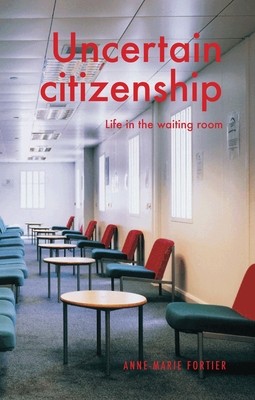
- We will send in 10–14 business days.
- Author: Anne-Marie Fortier
- Publisher: Manchester University Press
- ISBN-10: 1526163705
- ISBN-13: 9781526163707
- Format: 14 x 21.6 x 1.4 cm, softcover
- Language: English
- SAVE -10% with code: EXTRA
Reviews
Description
Uncertainty is central to the governance of citizenship, but in ways that erase, even deny, this uncertainty. This book investigates this uncertainty from the unique vantage point of 'citizenisation': twenty-first-century integration and naturalisation measures that make and unmake citizens and migrants, while indefinitely holding many applicants for citizenship in what Fortier calls the 'waiting room of citizenship'. Fortier's distinctive theory of citizenisation foregrounds how the full achievement of citizenship is a promise that is always deferred: if migrants and citizens are continuously citizenised, so too are they migratised. Citizenisation and migratisation are intimately linked within the structures of racial governmentality that enables the citizenship of racially minoritised citizens to be questioned and that casts them as perpetual migrants.
Scrutinising life in the waiting room enables Fortier to analyse how citizenship takes place, takes time and takes hold in ways that conform, exceed, and confound frames of reference laid out in both citizenisation policies and taken-for-granted understandings of 'the citizen' and 'the migrant'.
EXTRA 10 % discount with code: EXTRA
The promotion ends in 18d.20:04:04
The discount code is valid when purchasing from 10 €. Discounts do not stack.
- Author: Anne-Marie Fortier
- Publisher: Manchester University Press
- ISBN-10: 1526163705
- ISBN-13: 9781526163707
- Format: 14 x 21.6 x 1.4 cm, softcover
- Language: English English
Uncertainty is central to the governance of citizenship, but in ways that erase, even deny, this uncertainty. This book investigates this uncertainty from the unique vantage point of 'citizenisation': twenty-first-century integration and naturalisation measures that make and unmake citizens and migrants, while indefinitely holding many applicants for citizenship in what Fortier calls the 'waiting room of citizenship'. Fortier's distinctive theory of citizenisation foregrounds how the full achievement of citizenship is a promise that is always deferred: if migrants and citizens are continuously citizenised, so too are they migratised. Citizenisation and migratisation are intimately linked within the structures of racial governmentality that enables the citizenship of racially minoritised citizens to be questioned and that casts them as perpetual migrants.
Scrutinising life in the waiting room enables Fortier to analyse how citizenship takes place, takes time and takes hold in ways that conform, exceed, and confound frames of reference laid out in both citizenisation policies and taken-for-granted understandings of 'the citizen' and 'the migrant'.


Reviews